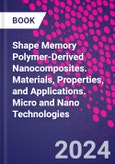Shape Memory Polymer derived Nanocomposites: Materials, Properties, and Applications summarizes fundamentals and applications of shape memory polymer derived nanocomposites. The book presents a state-of-the-art assessment, including updates on their flexibility, durability, heat stability, shape deformability, and the shape memory features of these polymers. Essential categories of the stimuli-responsive polymer-based nanocomposites are discussed in terms of recent scientific literature, and subsequent sections of the book are dedicated to the potential of shape memory polymer-based nanocomposite in various technical fields.
Please Note: This is an On Demand product, delivery may take up to 11 working days after payment has been received.
Table of Contents
1. Shape memory polymers: Mechanism, structure, and properties2. Shape memory polymer-based nanocomposites
3. Polyurethane in shape memory nanomaterials
4. Epoxy-based nanocomposites as emerging stimuli-responsive materials
5. Perspectives on stimuli-sensitive polyester nanocomposites
6. Shape memory polystyrene and trans-1,4-polyisoprene (TPI) derived nanocomposites
7. Cutting-edge shape memory nanocomposite sponges
8. Shape memory nanomaterials in aerospace
9. Electromagnetic interference shielding effect of stimuli-responsive nanocomposites
10. Multipurpose shape memory nanocomposites: Sensors, actuators, supercapacitors, electronics, and smart textiles
11. Versatile shape memory nanocomposites: Technological platform for biomedical applications
12. Modelling and simulation for shape memory nanocomposites
13. Future of shape memory nanocomposites: 3D and 4D printing, sustainability, and green shape memory nanocomposites
Authors
Ayesha Kausar National Centre for Physics, Islamabad, Pakistan.Ayesha Kausar currently works for the National Centre for Physics in Islamabad, Pakistan. She was previously affiliated with Quaid-i-Azam University and the National University of Sciences and Technology, both in Islamabad, Pakistan. She obtained her PhD from Quaid-i-Azam University and the Korea Advanced Institute of Science and Technology, Daejeon, South Korea. Dr. Kausar's current research interests include the design, fabrication, characterization, and exploration of structure-property relationships and potential prospects of nanocomposites, polymeric nanocomposites, polymeric composites, polymeric nanoparticles, polymer dots, nanocarbon materials (graphene and derivatives, carbon nanotube, nano-diamond, carbon nano-onion, carbon nano-coil, carbon nanobelt, carbon nano-disk, carbon dot, and other nanocarbons), hybrid materials, eco-friendly materials, nanocomposite nanofibers, and nanofoam architectures. Consideration of morphological, mechanical, thermal, electrical, anticorrosion, barrier, flame retardant, radiation shielding, biomedical, and other essential materials properties for aerospace, automotive, fuel cell membranes, Li-ion battery electrodes, electronics, sensors, solar cells, water treatment, gas separation, textiles, energy production and storage devices, biomaterials, and other technical relevance are among her notable research concerns.








